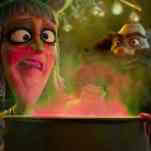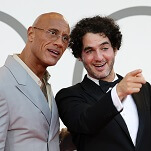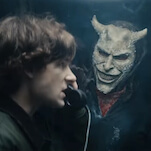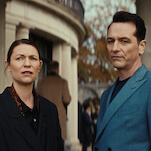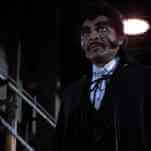Caroline Siede: On November 23, 2013, Doctor Who turns 50 years old. It’s a remarkable milestone, made even more remarkable by the fact that the show is at its peak of popularity. What started as an odd little black-and-white sci-fi drama in 1963 has become one of the most successful franchises in the history of television, and the 50th-anniversary special, “The Day Of The Doctor,” is being simulcast in more than 75 countries. Yet the series hasn’t gained this international fan base without also dividing it: Two showrunners have helmed the series since its 2005 reboot, and Doctor Who devotees remains embroiled in “Russell T. Davies versus Steven Moffat” debates. To me there is no contest: Russell T. Davies’ character-focused and surprisingly dark take on the show is the superior version.
The lynchpin of Davies’ show is, of course, the Doctor. Davies wrote both the battle-hardened Ninth Doctor (Christopher Eccleston) and the playful but dangerous 10th Doctor (David Tennant). In Davies’ reboot, the Doctor is the only survivor of the Time War, a battle so violent he killed his own people to stop it. The guilt of genocide hangs heavily over the character, and in both regenerations there’s a sense that his exuberant persona hides deep sadness. It’s nuanced character work helped by two stellar actors who portray the Doctor’s deep sadness while also finding his optimism. The contradiction works like gangbusters because it grounds a family-friendly show in something more serious.
Davies’ Doctor is a deeply flawed person who sometimes loses his empathy in the process of trying to save the universe. To balance the Doctor’s alien perspective, Davies gave the show strong female characters—not in the stereotypical sense of ass-kicking ladies, but in the sense of rich, well-developed women with unique personalities, flaws, and dreams. Rose Tyler (Billie Piper), Martha Jones (Freema Agyeman), and Donna Noble (Catherine Tate) serve as the Doctor’s humanity, chastising him when he goes too far. They’re foils to the Doctor, yet Davies also imbued them with agency and backstories that make them compelling characters on their own: Over the course of her two seasons on the show, Piper’s Rose grows from an adrift shopgirl to a defender of the universe. It’s an impressive arc for a female character billed as a “companion” to the main star.
Davies’ attention to character extends to supporting players as well. Doctor Who’s episodic structure gives the show little continuity from one adventure to another, yet the showrunner and his writing staff created memorable characters in remarkably short periods of time. The drivers of “Gridlock” and the space explorers in “The Impossible Planet”/“The Satan Pit” and “The Waters Of Mars” feel like personalities that exist beyond the edges of their stories. Their character traits don’t provide necessary exposition or move the plot along, but they do round out the world of Who and make the universe seem as beautiful and diverse as the Doctor claims it to be.
What did you think of Davies as a showrunner, Alasdair? Is it fair to say he brought a newfound character focus to the series? As a fan of classic Who, what was it like to watch the show rebooted for a modern era?
Alasdair Wilkins: Like all Doctor Who fans, I owe Russell T. Davies an enormous debt of gratitude. It’s easy to forget how ridiculous a proposition Davies’ reboot once seemed, and just how much his efforts have restored the entire franchise’s reputation in the public imagination. (And when we say Davies, we really mean him in collaboration with Julie Gardner, Mal Young, and the rest of the creative team.) Davies made all the right decisions in reviving the show, even though many seemed counterintuitive: casting Billie Piper, then a pop star with minimal acting experience, as Rose, and actually building the show around her; casting Christopher Eccleston, one of Britain’s acting heavyweights, as the face of the show; taking a deliberate pace in reintroducing the classic show’s most iconic elements, instead of inundating new and casual viewers with jargon like “Time Lord,” “Gallifrey,” “Skaro,” and “Davros.”
I became a Doctor Who fan in 2002, so I was part of the last group of fans to view the new series through the prism of the classic series and not vice versa. Because I got into the show as a teenager, I didn’t approach Doctor Who as an exercise in nostalgia; rather, as I sampled the different Doctors and their eras through the DVD releases, I fell in love with the infinite potential and madcap adventurism of the show’s premise. The joy of Doctor Who is that it can be anything. The show regenerates just like its time-traveling protagonist—there are at least a dozen distinct TV shows to be found within those first 26 seasons.
Davies’ Doctor Who was the first I saw unfolding in real-time, but I still have significant issues with its approach. Criticizing this era is tricky, because it was such an inarguable success both commercially and critically. I’m not arguing that Davies’ vision was flawed because it was popular. However, I think the instincts Davies brought to the show as executive producer made him a poor fit as the show’s main writer. If Doctor Who’s defining trait, to quote Craig Ferguson, is “the triumph of intellect and romance over brute force and cynicism,” then Davies rendered that on a grand scale. But as a writer, that tended to translate to dumb comedy and cringeworthy goofiness: the constant fat and fart jokes in “Aliens Of London”/“World War Three,” the 100,000-year-old reality shows in “Bad Wolf,” the inexplicable kung fu monks in “Tooth And Claw,” and whatever it is that actually happens in “Love & Monsters.”
The best Doctor Who episode Davies ever wrote was “Midnight,” a destruction of so many of the “warm and fuzzy” ideas his episodes espoused. That story—along with Torchwood: Children Of Earth, his other superlative effort in the Doctor Who universe—isdefined by a nastiness and a despair toward humans’ capacity for inhumanity, and I don’t think it’s a coincidence that Davies’ writing is so much sharper and more focused in those stories than it ever is elsewhere.“Midnight” is also notable because it’s the smallest-scale of Davies’ Doctor Who episodes. The adventure takes place in a confined space, and there’s no suggestion that the story’s unseen monster poses a threat to anyone beyond a handful of tourists. Davies’ episodes, particularly his season finales, are defined by threats of a global scale, and his scripts lack the discipline necessary to make such vast stories hold together. “The Parting Of The Ways” attempts to set up a focused moral dilemma for the Doctor as entire continents melt in the view-screen behind him. In “Last Of The Time Lords,” meanwhile, Davies undoes the harm caused by the story’s central time paradox but still leaves the president of the United States—an obvious George W. Bush pastiche—obliterated by mysterious aliens.
As I suggested previously, Doctor Who should be seen as a creative sandbox, one in which each Doctor and each creative team reshapes the show’s malleable premise. I subscribe to the notion that the show’s universe is so huge and so flexible that the incumbent production team should be judged not on whether it is making the “best” show but rather how its stories play within and push against the boundaries of that vast, wondrous mythos. I tend to judge that more in terms of each individual adventure—an artifact of classic Who’s structure, in which the season’s stand-alone stories were each serialized over a few episodes. Not judging the show on terms of a season’s overarching narrative is perhaps why I look upon Steven Moffat’s Doctor Who more fondly than others these days.
At its best, Moffat’s writing is what I call “plot pyrotechnics.” His stories are insanely complicated contraptions in which cause and effect intermingle. More than any showrunner before him, Moffat has explored time travel as something beyond a narrative convenience: The Doctor’s dalliances through time can rewrite people’s lives and the fates of entire universes, and that responsibility can be both blessing and curse. And while that might seem like a potentially limiting vision—yes, I’m all too aware of Moffat’s reputation as something of a one-trick pony—three consecutive episodes represent the vastly different ways Moffat has explored that idea.
Moffat’s first stab at a season finale, the fifth season’s “The Big Bang,” shows the Doctor breaking all the rules of time in a collapsed universe in order to restore the cosmos before winding back through his own timeline—which allows Moffat to rather audaciously re-contextualize a scene from an earlier fifth-season episode, “Flesh And Stone.” The subsequent Christmas special, “A Christmas Carol,” looks at the Doctor’s temporal tampering in more character-based terms, as the Doctor either ruins or saves the life of Michael Gambon’s miserable bastard Kazran Sardick. The season premiere that follows, “The Impossible Astronaut,” kicks off the sixth season’s big mystery, as a future version of the Doctor is apparently killed before his companions’ eyes, raising major questions about fate that the show takes an entire season to answer. A later scene in “The Impossible Astronaut” also adds some texture to the temporally inverted relationship between the Doctor and companion River Song (Alex Kingston), as the latter mournfully observes how painful it is to look upon a Doctor who knows her less and less every time she meets him. Moffat definitely doesn’t place the same emphasis on character as his predecessor, but he has his moments, and those moments are often intriguingly rooted in the show’s core sci-fi elements.
While Davies envisioned Doctor Who as the story of the Doctor and the companion, Moffat’s showis simply the story of the Doctor. This becomes especially evident in the “Silence” arc of season six, as companions River, Amy, and Rory get caught up in a temporally tangled, cosmos-spanning conspiracy to kill the Doctor. The emotional trauma this arc causes to the Doctor’s companions should be substantial, but that isn’t an area given any exploration—the companions are just there to serve the plot. I’ll leave it Caroline to take those critiques further—but I will say that, viewed purely as the Doctor’s story, season six improves. He comes to terms with his impending demise, and the season finale, “The Wedding Of River Song,” finds the Doctor doing what he always does—escaping the inescapable trap—even if it means fooling the entire universe.
This era of Doctor Who has also allowed for more experimentation within individual stories, and a lot of that is because of the remarkable talent Moffat brought to the show. Neil Gaiman, Neil Cross, and Richard Curtis are three of Britain’s most in-demand writers, and their (strongest) contributions—“The Doctor’s Wife,” “Hide,” and “Vincent And The Doctor,” respectively—allow their creative voices to shine through, taking the 11th Doctor to places he could never reach in Moffat-penned episodes. The current era also features the two funniest episodes in new Who, as the team of Matt Smith, co-star James Corden, and writer Gareth Roberts gave us “The Lodger” and “Closing Time.” The former in particular feels like an episode that wouldn’t work for Davies’ Doctor Who—even if it did begin its life as a comic featuring the 10th Doctor.
Caroline, you’ve found Moffat’s tenure deeply frustrating, but would you be willing to grant that its episodes work as stand-alone adventures, even if the last two seasons fail as coherent narratives?
CS: Alasdair, you mentioned earlier that Davies’ strengths lay in executive-producing rather than episodic writing, and I wonder if the inverse is true for Moffat. Perhaps he’s better suited to writing one-off adventures than he’s suited to overseeing an entire series. I agree wholeheartedly that “A Christmas Carol” is an excellent adventure, and “The Big Bang” easily ranks in my top-five favorite episodes of Who.(I gasped out loud at the call back to “Flesh And Stone.”) While any given episode that aired during Moffat’s tenure is guaranteed to look and feel exciting, there is a depressing lack of plot, character, and thematic continuity to his program as a whole. Moffat seems to approach the show with the question “What’s the coolest thing I can do?” but is largely uninterested in exploring the consequences of his plot pyrotechnics. Moffat’s refusal to present even the most basic examples of cause and effect make it difficult to emotionally invest in his work.
I’ve breezed over some of Davies’ messier plot mechanics, but I think Moffat invites a more intense level of criticism on that front because he puts a focus on his season-long mysteries. I wouldn’t complain as much if the rather unsatisfying conclusion to “The Wedding Of River Song” answered a question that was raised at the top of the episode. But Moffat makes the mystery of the Doctor’s death a crucial plot point in his season-six premiere and teases it out for 13 episodes—inviting the viewer to figure out how the Doctor will eventually survive his astronaut assassination. While the nonlinear structure of season six hides some of the plot messiness, it’s nonsensical at best and leaves behind gaping plot holes about the Silence’s convoluted plans (which inexplicably involve a space suit). Again, I wouldn’t mind the silly mechanics of all of this as much if Moffat weren’t so insistent on making this mystery a prominent, multi-episode arc.
Moffat also has frustratingly little interest in character continuity. The Doctor has always taken a stand against violence whenever possible, but in “Day Of The Moon”he turns every member of the human race into a weapon, eager to murder the Silence on sight. While using the Silence’s own brainwashing powers against them is a clever idea, I don’t buy that a Doctor who constantly celebrates the innate goodness of humanity would be so willing to turn the human race into unwitting murderers. Genocide is a topic Doctor Who tackles with care and consideration (even elsewhere in Moffat’s tenure), and to see it used so casually here is frustrating. Especially because it’s a choice that has no ramifications on the Doctor’s psyche. In fact, it’s never referenced again.
These character inconsistencies are even more magnified in Amy Pond, the 11th Doctor’s main companion. In season six she discovers she has unknowingly been kept hostage for months, delivers a baby she did not know she was pregnant with, and then has that baby stolen from her twice. On top of that, she discovers her baby grows up to be the middle-aged woman she has been running around with for the past year. It would be a traumatizing experience for anyone, and an event that would cause strain in the Amy-Doctor relationship. Yet the emotional reality of that ordeal is almost entirely ignored. Amy half-heartedly asks the Doctor to find her baby, but she seems mostly unconcerned when he doesn’t, and the show quickly moves on to “more important things” like jokes about Hitler being pushed into a cupboard. Only a few episodes later in the excellent “The God Complex,” she blindly trusts the Doctor once again because the plot requires her to do so. I find it hard to believe that the fiercely protective Amy—who constantly demonstrates she would rather die than live without husband Rory—would accept the loss of her baby so easily or forgive the Doctor so readily.
This is also part of a larger trend of Moffat’s treatment of female characters. In general, almost all of Moffat’s ladies are “mysteries” for the Doctor to solve—Amy has a mysterious crack in her wall followed by a mysterious pregnancy, River is a timeline conundrum, and Clara (Jenna Louise-Coleman) is referred to as “the impossible girl.” While these women serve as dynamic companions to the Doctor, the show has a bad habit of turning them into plot points. Moffat seems generally uninterested in the families, friends, or careers of his supporting female characters, making them frustratingly underdeveloped. Amy’s long-lost parents and their eventual return in “The Big Bang” are major concerns of season five that are immediately dropped so Amy can run away on more adventures. These female characters exist only insomuch as they relate to the Doctor, and anything outside of their time-traveling adventures is irrelevant. Whatever Moffat’s intention, he is continuing the frustrating pop-culture trend of writing women who revolve around men. Add to this the fact that most of the women he writes are sassy, aggressive, and flirty—all of which are fascinating traits for a female character but feel rather reductive when repeated ad nauseam.
While you’re right, Alasdair, that I’ve found Moffat’s tenure frustrating, I feel it’s important to stress that Moffat has written some of my all-time favorite episodes, and part of the reason I can critique his episodes in such detail is because I’m a fan who has watched them many times. I have a deep affection for Rory, Amy, River, and the 11th Doctor. While Moffat doesn’t always have Davies’ eye for character development, his wonderfully talented actors (Arthur Darvill, Karen Gillan, Alex Kingston, and Matt Smith) provide much-needed emotional legwork through their performances. I am continually delighted by Amy and Rory’s progressive marriage, and the friendship between Amy and the 11th Doctor is built up quite subtly for two and a half seasons. River Song could be my favorite character in all of Doctor Who, and giving a younger Doctor a badass love interest over 40 is revolutionary in its own way).
Doctor Who’sscope is bigger than just about anything else on TV. Through the prism of a 1,000-year-old alien, both showrunners have explored the human condition, love, loss, and friendship in ways that don’t feel trite or clichéd. And I certainly can’t wait to watch David Tennant and Matt Smith team up in “Day Of The Doctor” (if only to hear Tennant shout “allons-y” one more time). While I do have problems with some of his creative choices, I choose to remain optimistic that working with Peter Capaldi’s soon-to-debut 12th Doctor will allow Moffat to recapture some of the magic of his earlier efforts.
Can we come to some sort of agreement here, Alasdair? Is there, in fact, common ground between Davies loyalists and Moffat fanatics?
AW: I think there’s an opportunity for agreement and common ground here, Caroline, and it all comes from an understanding of just what Davies and Moffat are trying to do with Doctor Who. Steven Moffat does indeed write toward the coolest and most surprising plot twists, while Russell T. Davies writes toward the emotional climaxes. Because the premise of Doctor Who is so vast, they both end up cutting some narrative corners in pursuit of those moments. I can see why some might argue that Davies’ approach is richer or more fulfilling, but it’s still worth remembering how much of the apparent plot of his stories is just a means to that emotional end. That isn’t necessarily a criticism. I never cared about the 10th Doctor and Rose’s relationship, yet the end of “Doomsday” still gets to me, because it’s a beautifully emotional moment supported by a story that is solidly constructed and consistently entertaining—if occasionally a bit workmanlike in its plotting.
There’s never going to be a perfect version of Doctor Who. Every showrunner is going to have to choose which particular aspects of the show to focus on, and that’s probably going to be to the detriment of something else. It seems only appropriate to sum up why Doctor Who can be so frustrating yet so exhilarating with what the 11th Doctor once observed about Vincent Van Gogh:
The way I see it, every life is a pile of good things and bad things. The good things don’t always soften the bad things, but vice versa, the bad things don’t necessarily spoil the good things or make them unimportant.
That sounds about right.










